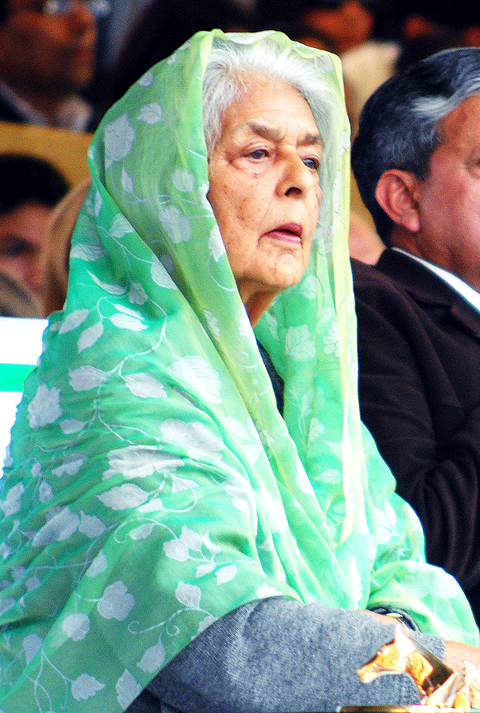The death of an Indian queen who personified a lost era of aristocratic privilege and exotic glamour has sparked a bitter inheritance dispute among her surviving family.
Gayatri Devi was one of the most celebrated beauties of the last century, mixing traditional palace life in the royal city of Jaipur with private airplanes, cocktail parties and shopping trips to London.
She and her dashing husband, the Maharajah of Jaipur, Man Singh, whom she married in 1940, were idolized by Jaipur’s local population and the international press, but her death has revealed a family at odds over property and money.

PHOTO: AFP
Indian newspapers have reported that many relatives are in conflict with each other and that, since Gayatri Devi’s death on July 29, they have been positioning themselves for the coming battle over her will.
The Times of India predicted an “ugly showdown” over a fortune estimated at between US$200 million and US$400 million, with the lease of the stunning Rambagh Palace in Jaipur likely to be one of many areas of dispute.
Gayatri Devi and the Maharajah lived in Rambagh when they first married before it was converted into a 80-room “heritage” hotel.
After her husband died in 1970, she lived in Lilypool, a smaller house in the palace grounds.
Local media reported that a door she used to walk between the two buildings had been mysteriously bricked up since her death — an apparent first move in the complex legal wrangles that lie ahead.
Gayatri Devi’s only son, Jagat Singh, died in 1997 and the Times reported that her grandchildren, Devraj and Lalitya, have been waiting until official mourning finished at the weekend to press their claims.
“Things will be clear only after the will is read out,” an unnamed associate of Devraj was quoted by the newspaper as saying. “Disputes will send a wrong message and damage the family’s reputation.”
Gayatri Devi was the third of the Maharajah of Jaipur’s three concurrent wives and when he died on the polo field the title passed to Bhawani Singh, the son of his eldest wife.
Different branches of the family still exert control over the Jaipur estate, which has remained partially intact long after the system of “princely states” was dismantled following independence from Britain in 1947.
The fate of Gayatri Devi’s legacy — including stakes in at least 17 palaces, forts, hotels and houses, plus a famous jewelry collection — is unclear even to insiders.
The Statesman newspaper suggested that she may have changed her will at the expense of her two grandchildren.
Her son married into the Thai royal family and left India, but the marriage ended amid much acrimony.
“He was not allowed to see or communicate with his children,” Gayatri Devi told one interviewer recently. “He took to drinking to offset his unhappiness and in the end this caused a liver problem and eventually his death.”

In the sweltering streets of Jakarta, buskers carry towering, hollow puppets and pass around a bucket for donations. Now, they fear becoming outlaws. City authorities said they would crack down on use of the sacred ondel-ondel puppets, which can stand as tall as a truck, and they are drafting legislation to remove what they view as a street nuisance. Performances featuring the puppets — originally used by Jakarta’s Betawi people to ward off evil spirits — would be allowed only at set events. The ban could leave many ondel-ondel buskers in Jakarta jobless. “I am confused and anxious. I fear getting raided or even

Kemal Ozdemir looked up at the bare peaks of Mount Cilo in Turkey’s Kurdish majority southeast. “There were glaciers 10 years ago,” he recalled under a cloudless sky. A mountain guide for 15 years, Ozdemir then turned toward the torrent carrying dozens of blocks of ice below a slope covered with grass and rocks — a sign of glacier loss being exacerbated by global warming. “You can see that there are quite a few pieces of glacier in the water right now ... the reason why the waterfalls flow lushly actually shows us how fast the ice is melting,” he said.

Eleven people, including a former minister, were arrested in Serbia on Friday over a train station disaster in which 16 people died. The concrete canopy of the newly renovated station in the northern city of Novi Sad collapsed on Nov. 1, 2024 in a disaster widely blamed on corruption and poor oversight. It sparked a wave of student-led protests and led to the resignation of then-Serbian prime minister Milos Vucevic and the fall of his government. The public prosecutor’s office in Novi Sad opened an investigation into the accident and deaths. In February, the public prosecutor’s office for organized crime opened another probe into

RISING RACISM: A Japanese group called on China to assure safety in the country, while the Chinese embassy in Tokyo urged action against a ‘surge in xenophobia’ A Japanese woman living in China was attacked and injured by a man in a subway station in Suzhou, China, Japanese media said, hours after two Chinese men were seriously injured in violence in Tokyo. The attacks on Thursday raised concern about xenophobic sentiment in China and Japan that have been blamed for assaults in both countries. It was the third attack involving Japanese living in China since last year. In the two previous cases in China, Chinese authorities have insisted they were isolated incidents. Japanese broadcaster NHK did not identify the woman injured in Suzhou by name, but, citing the Japanese